 Petzlover
Petzlover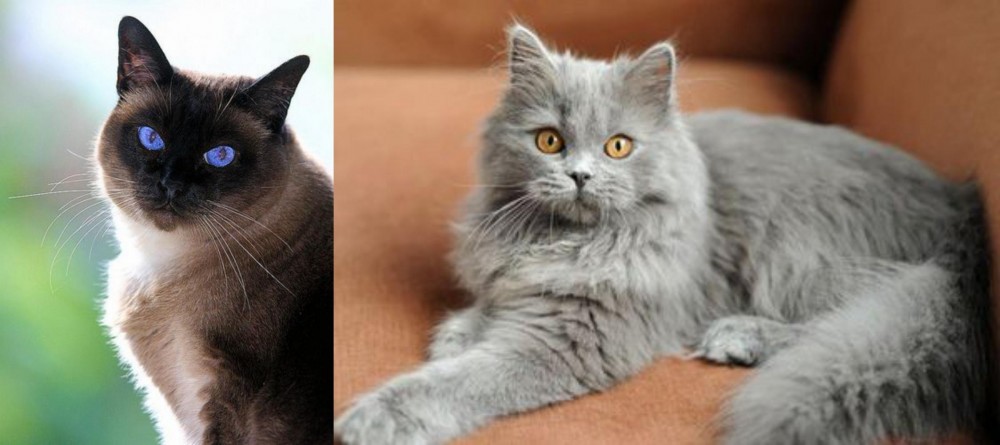 Applehead Siamese is originated from Thailand but British Semi-Longhair is originated from United Kingdom. Both Applehead Siamese and British Semi-Longhair are having almost same weight. Applehead Siamese may live 11 years more than British Semi-Longhair. Both Applehead Siamese and British Semi-Longhair has same litter size. Applehead Siamese requires Low Maintenance. But British Semi-Longhair requires Moderate Maintenance
Applehead Siamese is originated from Thailand but British Semi-Longhair is originated from United Kingdom. Both Applehead Siamese and British Semi-Longhair are having almost same weight. Applehead Siamese may live 11 years more than British Semi-Longhair. Both Applehead Siamese and British Semi-Longhair has same litter size. Applehead Siamese requires Low Maintenance. But British Semi-Longhair requires Moderate Maintenance
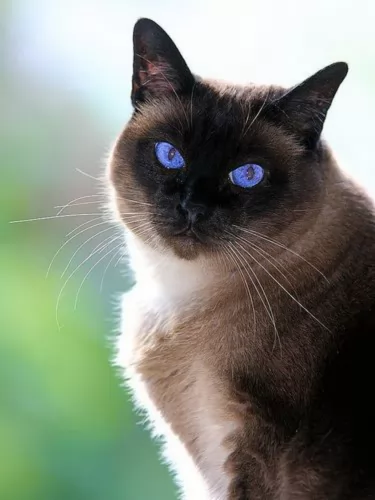 As the traditional Siamese cats from Siam, now known as Thailand, this ancient breed of cat goes back to 1350AD. It is believed that these Traditional Siamese cats were first exported to the west in the 19th century.
As the traditional Siamese cats from Siam, now known as Thailand, this ancient breed of cat goes back to 1350AD. It is believed that these Traditional Siamese cats were first exported to the west in the 19th century.
The Applehead is a Siamese cat that looks the way Siamese looked when they were first brought out to the United States in the 19th century. Breeding with other cat breeds is what developed the Applehead Siamese.
The Applehead seal point was also imported to Britain. Breeders have developed other point colors and head shapes by cross-breeding long- and short hairs, but all Siamese are essentially bred from the Applehead seal point.
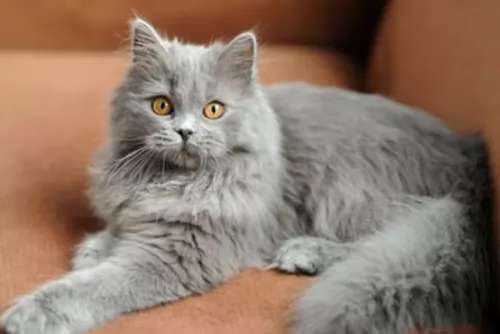 The British semi-Longhair cat is exactly like the British Shorthair except when it comes to the coat length - the hair is longer.
The British semi-Longhair cat is exactly like the British Shorthair except when it comes to the coat length - the hair is longer.
During the 20th century, a short-haired version of the modern Persian was developed and it was then proposed that a long-haired cat of the British type make it into the cat fancy.
The British Shorthair cat was bred with different Persian cat breeds which then resulted in a cat that looked like the British Shorthair cat, just with longer hair. It is recognized separately in the United States of America but considered one and the same as the short hair in the United Kingdom.
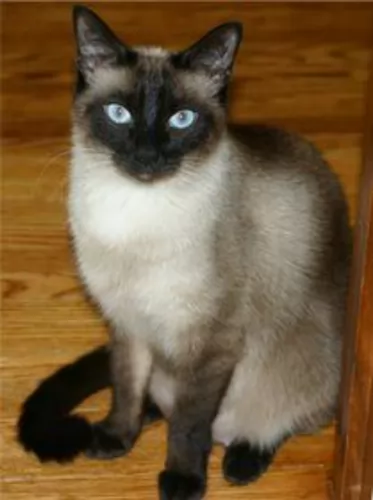 There is no denying that the very recognizable Siamese cats are one of the most popular cat breeds there are, known also for being very vocal.
There is no denying that the very recognizable Siamese cats are one of the most popular cat breeds there are, known also for being very vocal.
The female Applehead weighs between 3 and 5kg and the male might weight a bit more, as much as 6,8kg.
Siamese cats are all born white but as they mature they develop their deeper color points. There are actually 3 types of Siamese cats, with the Traditional Siamese being known as the Apple Head - the original breed of Siamese.
This particular Siamese is a bit bigger and larger-boned than the modern Siamese, with the body being more muscular and heavier. The head of the cat is fairly round- or apple-shaped with the eyes also being somewhat rounder than other types of cats.
The legs are long and the tail long too and the cat has a fairly short, silky coat.
These cats look intelligent and they are, so much so, that it will be important to present them with lots of toys that make them think and require some skills.
They also love receiving attention from their human owners and although they are also vocal, they don’t talk as much as the modern Siamese cats.
They're curious and playful and don’t like being left alone for too long. They also get on well with children and other pets in the home but are inclined to become more attached to one particular person, wanting to follow their favorite human around.
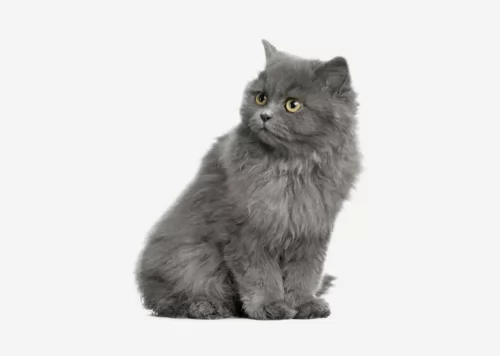 The British Semi-longhair can become quite a large cat really and is described as a medium to large cat. In fact, a full-grown British Semi-Longhair can grow to be about 7.5kg in weight.
The British Semi-longhair can become quite a large cat really and is described as a medium to large cat. In fact, a full-grown British Semi-Longhair can grow to be about 7.5kg in weight.
They’re compact and robust with short, strong legs. The longish coat can be in all colors and patterns and he sheds moderately. Color can be white, cream, chocolate, blue and colors can be solid, ticked or bi-colored.
The ears are wide-spaced and medium-sized and they eyes are almond-shaped and match the color of its coat.
The British Semi-Longhair cat is such an easy-going pussycat while being reserved, independent and undemanding. He will get on with children and other pets in the home. Perhaps he suits someone who loves the idea of having a gorgeous pet around, but who is working and doesn’t have that amount of time to devote to a cat.
The British semi-longhair is one of those cats that doesn’t mind too much if you disappear to work each day. He can amuse himself without you during that time, as long as he has some nice toys and a nice environment to chill.
It’s not the kind of cat to follow you around, making it perfect for anyone who doesn’t have the time to give the cat too much attention. It’s simply not a lap-cat.
The cat isn’t very active at all and is more than happy to sit in his favorite spot in the sun and to watch activities from there. This is a quiet, content cat, not wanting to meow unnecessarily and his round face shows off a happy disposition.
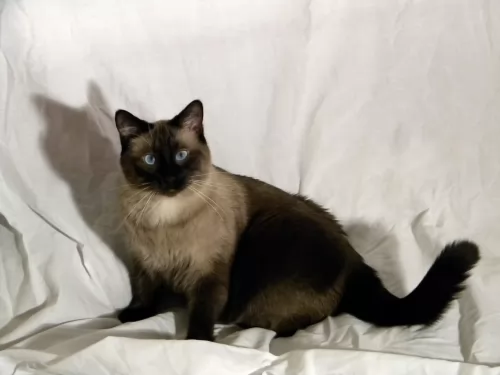 Applehead Siamese cats are very friendly and loving pets. They are intelligent and very beautiful too, with their amazing blue eyes.
Applehead Siamese cats are very friendly and loving pets. They are intelligent and very beautiful too, with their amazing blue eyes.
You will enjoy their friendship as they are prepared to become totally devoted to you, and of course, your playful cat will provide you with lots of laughs and entertainment too. The Applehead Siamese is known to make a splendid pet for you and once you've owned one, you'll think twice before getting another cat breed.
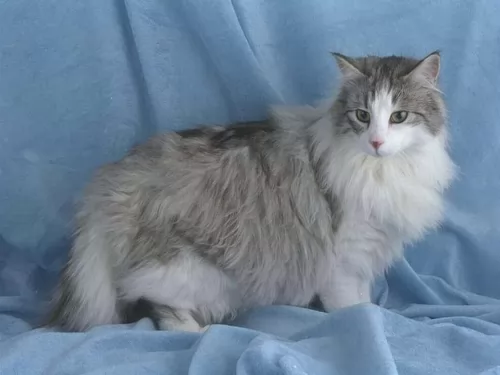 This moderately shedding cat is such a balanced cat – it is good with everyone, is quiet and unassuming. It just quietly gets on with life, being content and satisfied with its lot.
This moderately shedding cat is such a balanced cat – it is good with everyone, is quiet and unassuming. It just quietly gets on with life, being content and satisfied with its lot.
If you’re looking for a more ‘involved’, vocal, active cat, the British semi-longhair isn’t for you. If you however, want a quiet, steady presence in your home, this lovely cat is for you.
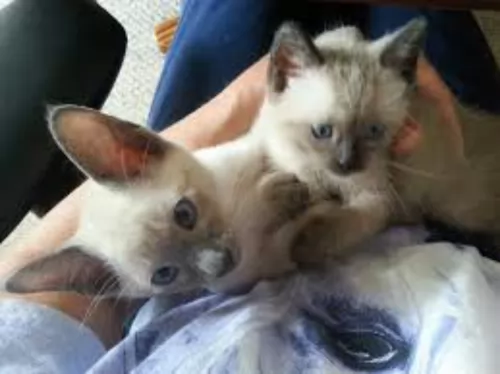 These are a healthy breed of cat and they have always been known to live longer than the modern Siamese cats.
These are a healthy breed of cat and they have always been known to live longer than the modern Siamese cats.
With good care they can live to be up to 20 to 25 years of age. Good nutrition and a loving environment can help to eliminate diseases that the Siamese might have to endure. Some of these can be a blockage in the stomach, skin cancer, feline diabetes, hip dysplasia, and disrupted visual pathway which causes a squint.
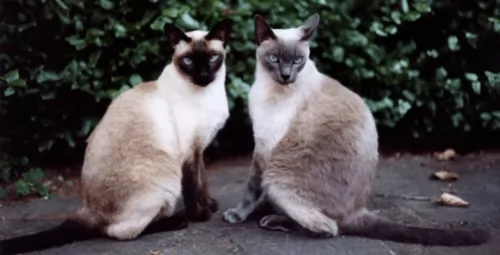 These cats have special nutritional needs and you want to be aware that obesity is a growing problem with modern-day cats. Make sure your Applehead has a healthy diet to maintain a healthy weight so that he keeps his lithe, lean looks.
These cats have special nutritional needs and you want to be aware that obesity is a growing problem with modern-day cats. Make sure your Applehead has a healthy diet to maintain a healthy weight so that he keeps his lithe, lean looks.
You might want to try a little bit of homemade food to enhance your Siamese cat's commercial food which is a mix of top quality meat-based wet- and dry food. You can speak to your vet about feeding your Applehead Siamese because you want to know which food is best for such a cat.
These days the best cat food manufacturers make sure that their cat foods are made up of tasty ingredients such as real chicken and whole brown rice formulated with the right balance of vitamins and minerals to meet the dietary needs of every cat breed and the season of life they are in.
Because of the Siamese cat’s short hair with no undercoat, the cat requires less brushing than other cats.
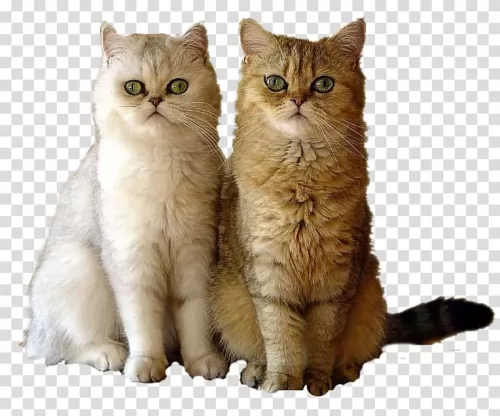 Because of the semi-longhair, the British Semi-Longhair will require more effort than short hair cats with keeping the coat free of tangling. It’s a good idea to get this cat used to a brush-session to free the coat of dust and loose hairs at least once or twice a week.
Because of the semi-longhair, the British Semi-Longhair will require more effort than short hair cats with keeping the coat free of tangling. It’s a good idea to get this cat used to a brush-session to free the coat of dust and loose hairs at least once or twice a week.
Other basic grooming requirements for your kitty kat would be to keep the claws short, to check inside the mouth for dental problems, to check inside the ears for dirt and redness and to check the eyes to make sure they’re bright and clear. If there is a discharge, wipe the eyes gently with warm water and some apple cider vinegar. Be very gentle with all your grooming processes for your cat.
The British semi-Longhair enjoys his food and if you don’t feed him in a responsible manner he can become obese. He is such a beautiful cat this that you want to ensure he gets the best premium quality food there is – food that is high in proteins.
It’s not worth feeding your beautiful semi-longhair on inferior foods as this can impair his health.
Cats are carnivores – related to lions – they’re meat-eaters. As far as their diet is concerned, they need fats and proteins and not carbs.
When you’re choosing food for your British semi-Longhair, check out the label to make sure you know precisely what your cat is taking in. When you are 100% sure that the food is the best it can be and your cat loves it, give it to him.
Don’t change foods haphazardly, as this cat likes a lifestyle devoid of sudden changes. If in any doubt, get advice from your vet on weight and calorie intake for your pet.